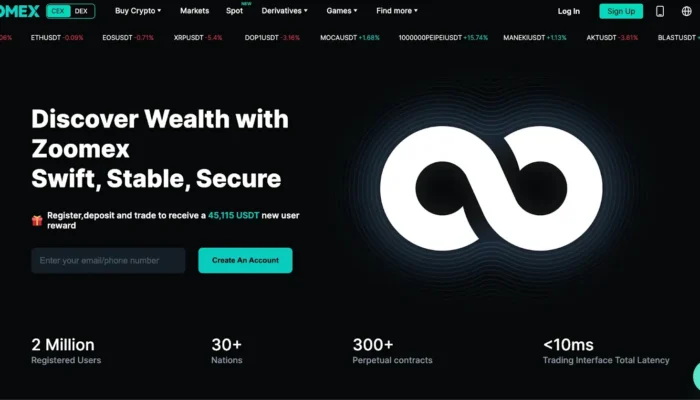
Crypto debit cards (sometimes called bitcoin debit cards) allow you to spend your crypto assets in the real world, just like a standard debit card. These cards generally link to a crypto wallet or online account where you’ve stored bitcoin or other crypto assets. When you use the card to make a purchase, your crypto converts into dollars before the merchant processes it.
In other words, these debit cards let you easily spend your crypto assets, just like cash. Unlike crypto credit cards, you are not spending money you don’t have: think of these like a prepaid card or gift card, but loaded up with crypto instead of cash.
Crypto debit cards come in two flavors:
-----Cryptonews AD----->>>Sign up for a Bybit account and claim exclusive rewards from the Bybit referral program! Plus, claim up to 6,045 USDT bonus at . https://www.bybit.com/invite?ref=PAR8BE
<<<-----Cryptonews AD-----
- Spend your original crypto: Some cards, like those from Coinbase, allow you to spend your crypto at any merchant that accepts Visa. Your crypto is converted into cash at the point of sale.
- Convert to native token: Other cards, like those from Crypto.com, convert your crypto to their own native token. Since this is like investing in a different asset, be sure to do your research before loading up these cards.
In this piece, we’ll show you our picks for best crypto debit cards for 2022.
| Card | Description | Fees | Crypto Support | Rewards |
|---|---|---|---|---|
| Coinbase | Visa-backed cryptocurrency debit card | 2.49% transaction fee | Supports 9 cryptocurrencies | Up to 4% |
| Blockcard | Virtual or physical debit card backed by Visa | $3 for U.S withdrawals, $3.50 internationally | Supports 13 currencies, including bitcoin (BTC) and Ethereum (ETH) | Up to 6% cashback |
| Wirex | Debit card supporting card cryptocurrencies and fiat currencies | No monthly maintenance fees. 1% fee for funding | Supports multiple currencies, including BTC, ETH, AND LTC | Up to 2% cashback |
| BlockFi | Bitcoin Rewards crypto debit card | No annual or foreign transaction fees | Bitcoin | 1.5% to 3% |
| Bitpay | Bitpay prepaid Mastercard | $2.50 for ATM withdrawals | Just 6, including BTC and ETH | No cashback |
| Crypto.com | Visa Prepaid card | No annual fees. $2.50 ATM fees | 90 different cryptocurrencies | Cashback (up to 8%, depending on card) |
| Nuri | Debit card for customers based in the European Union | Nuri only charges trading fees for BTC and ETC trades | Bitcoin and Ethereum | No cashback |
| Binance | European Crypto debit card | 0.9% for ATM withdrawals and transaction fees | Supports 30 cryptocurrencies | 8% cashback |
 Coinbase
Coinbase
Brian Armstrong and Fred Ehrsam founded Coinbase on June 1, 2012, and since then, it’s grown to become one of the world’s largest and most respected crypto companies. (See our piece on How to Invest in Coinbase.)
The company’s crypto debit card allows cardholders to spend cryptocurrencies like bitcoin (BTC) and Ethereum (ETH) anywhere Visa is accepted.
Your cryptocurrency debit card links to your Coinbase account, and all withdrawals come from there. To get started, you just need to open a Coinbase account or download the app, load it up with crypto, then request a debit card.
Pros:
- World-class security from a trusted crypto exchange.
- Contactless payments.
- Rewards and cashback.
- Availability: Worldwide from ATMs, online, and in-store.
Cons:
- Users need a Coinbase account.
- Fees: Liquidation fees of 2.49% apply.
- Only 9 cryptos supported.
Conclusion: The Coinbase debit card is good for customers requiring ease of access to their cryptocurrencies, backed by the leading U.S. crypto exchange.
 Blockcard
Blockcard
Introduced by technology company Ternio, Blockcard offers virtual or physical debit cards and integrates with Apple, Google, and Samsung Pay.
You must register, make a deposit, complete the Know Your Customer check, and fund your account to get started.
To add funds to a card, you convert your crypto assets into Ternio tokens (TERN). This is different from other debit cards, which let you hold your crypto assets in, say, bitcoin or Ethereum until you’re ready to spend. Understand TERN’s price history before you invest.
Pros:
- Supports cryptos like Bitcoin, Ethereum and Litecoin, as well as fiat currencies like USD.
- Cashback rewards.
- 13 cryptocurrencies supported.
Cons:
- You must convert your crypto to Ternio tokens, which have historically not been stable in value.
- Fees: $3 for U.S ATM withdrawal fees, $3.50 internationally. A monthly $5 fee and transaction fees also apply.
- Available in United States only.
Conclusion: The Blockcard debit card is good for U.S. customers that want flexibility; be careful of converting your crypto value into TERN for the long term.
 Wirex
Wirex
Wirex is a UK-based company offering crypto debit cards for personal and business use. The company provides you with a contactless card, and an app to manage it.
Wirex’s main product, the Wirex Visa card, allows you to convert fiat currencies into cryptocurrency and use it at locations accepting contactless payments.
The card provides generous rewards, and many consider it among the best for consumer perks, like Wirex X-tras, which gives up to 2% crypto cashback, a 12% savings bonus on the balance of your WXT account, and access to exclusive merchant offers.
The Wirex debit card has additional benefits, including a wide range of cryptocurrencies and free or low fees, like free ATM withdrawals up to about $250 per month, then 2% thereafter.
To get started, register, verify your account, add funds, and order a Wirex card online or via the app.
Pros:
- Fees: No monthly maintenance fees. 1% account funding fee.
- Cashback rewards.
- 25 crypto assets supported.
- Availability: Widely available globally.
- Easy to use.
Cons:
- Limited availability worldwide.
- You need Wirex tokens to get the best rewards. Wirex tokens are the company’s cryptocurrency and they give customers to crypto rewards as well as access to Wirex’s DeFi ecosystem.new generation of decentralised finance
Conclusion: The Wirex debit card is good for customers that want a low fee card and easy access to a wide range of currencies and fiat.
 BlockFi
BlockFi
The Blockfi bitcoin debit card allows users to spend their crypto assets at any merchant accepting Visa cards.
It links directly to your cryptocurrency wallet, making it easier to spend your digital assets without converting them first.
There are several perks to signing up, including extra bitcoin for referrals and increased bonuses for new cardholders.
To get started:
- Register online using the “get started” form. Activate your account with the email verification code.
- Make a deposit.
- Fill out the requested personal information and KYC requirements.
Pros:
- Cashback bonuses.
- No annual or foreign transaction fees.
Cons:
- Only one currency (Bitcoin).
- Availability is limited to Visa merchants.
Conclusion: The BlockFi debit card is good for users who are just getting started and want to focus on one type of cryptocurrency while receiving cash back rewards.
 BitPay
BitPay
BitPay is an American company that provides bitcoin merchant processing services. It also offers bitcoin payment processing solutions to businesses.
Its crypto debit card links to your wallet through the BitPay app. You can then top up your crypto debit card via the app to convert your crypto and start spending.
To get started, download the app, set up the wallet, and order your debit card.
Pros:
- No exchange or conversion fees in the U.S.
- No annual fees. $2.50 ATM withdrawal fees apply.
- High ATM withdrawal levels.
- No withdrawal limits.
Cons:
- Limited to the United States.
- No cashback offered.
- Only 6 cryptos supported.
Conclusion: The Bitpay debit card is good for U.S. residents who don’t want to pay for exchange fees and are happy with a limited range of cryptocurrencies.
 Crypto.com
Crypto.com
Crypto.com is a Hong Kong-based crypto exchange platform specializing in providing bitcoin debit cards, cryptocurrency wallets, and other related products.
The crypto debit card uses Crypto.com’s CRO currency. Users must first buy these tokens to fund their cards. Be sure you research CRO before investing in this token; because Crypto.com has aggressively marketed its brand, the price is volatile.
The card allows you to spend your cryptocurrencies anywhere in the world that Visa is accepted.
Pros:
- Top up with crypto and fiat currencies.
- No annual fees.
- Over 90 cryptocurrencies available.
- Cashback rewards.
Cons:
- Cardholders must buy Crypto’s CRO tokens. (See historical price here.)
Conclusion: The Crypto.com debit card is good for customers that want access to a wide range of cryptocurrencies and a choice of cards with various rewards.
 Nuri
Nuri
Available to customers in the European Union, Nuri is a crypto debit card with all the features of a standard debit card.
You can use the Nuri wallet to deposit and withdraw currencies to and from your account and convert, send, and receive coins with other wallets in the network.
New users can order a debit card through the Nuri app, which arrives within 14 days.
Pros
- Advanced security features like biometrics and card blocking.
- No monthly or withdrawal fees.
- Nuri only charges trading fees for BTC and ETC trades.
Cons
- Limited availability (Europe only).
- No cashback.
- Only 2 cryptos supported (Bitcoin and Ethereum)
Conclusion: The Nuri debit card is good for European customers looking for cards without excessive fees.
 Binance
Binance
Binance is the largest cryptocurrency exchange worldwide; the company launched its own crypto debit card in 2020 to generally favorable reviews.
The card is available in physical and virtual form for both offline and online spending. Its low monthly fees and high cashback levels make it a favorite among European consumers.
If you’re a Binance customer, you can order their card from your Binance account, or use the “Card” link at the bottom of the Binance page.
Once you add funding from Binance’s “Spot” wallet and transfer it to the “funding” wallet, you can start spending.
Pros
- Cashback for every purchase. Amount depends on your card level and the amount of BNB in your account.
- Cost-effective.
- 30 cryptos supported.
Cons
- Limited availability (Europe only).
- Need to have large volumes of money in your account to reach the highest cashback levels.
- Transaction fees up to 9%.
Conclusion: The Binance debit card is good for European customers that want high levels of cashback.
Summary
Crypto debit cards are a convenient way to shift your cryptocurrency into fiat currency, for those who want to spend crypto just like cash.
Keep in mind there are two kinds of crypto debit cards: those which allow you to keep your crypto in its original form (bitcoin, Ethereum, etc.), and those which require you to convert to a native token (which is like investing in a different asset altogether).
Our top pick is the Crypto.com card, which offers a broad variety of cryptocurrencies, low costs, and wide availability. Keep in mind that you will need to convert your crypto to the CRO token, which adds an additional degree of risk to your holdings, so never put more on a debit card than you can afford to lose.
For more ways to manage your crypto investments, don’t forget to sign up for our free blockchain investing newsletter.
The post Best Crypto Debit Cards, Rated and Reviewed for 2022 appeared first on Bitcoin Market Journal.
Best Crypto Debit Cards, Rated and Reviewed for 2022


 Coinbase
Coinbase Blockcard
Blockcard Wirex
Wirex BlockFi
BlockFi BitPay
BitPay
 Nuri
Nuri Binance
Binance


